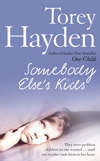Читать книгу: «Twilight Children: Three Voices No One Heard – Until Someone Listened», страница 2
Chapter Three
Cassandra and I sat together at the table, examining the drawing she had done of her family.
“That’s really quite an elaborate picture. Can you tell me more about it?”
“There I am. Up in the sky,” she said. “I look down on everyone. I can see everyone. I can see everything from the sky.”
“That sounds interesting, being able to see everything.”
She nodded. “I like being an alien.”
“If I were an alien, I think I would feel lonely,” I said, “because I’d feel I was different from everyone else. I’d feel like an outsider.”
“No, not me. I like it,” she replied. “Because I can travel in a rocket ship.”
Cassandra was a rather wriggly little girl, squirming around in her seat, bending her head down and around in a way that allowed her to look up at me while I regarded the picture. There was something coy about her behavior. This made me wonder if she had chosen to draw herself as an alien because she genuinely felt like an alien or if she had chosen to do it as a way of engaging me, as a sort of savvy assessment of what she’d thought a therapist would be interested in.
“And here we have your family,” I said. “Yes? Your mother, your stepfather, your two sisters – ”
“And the fish. The fish, too,” she interrupted and pointed to them.
“Ah, I thought they were leftover from when you were experimenting with shapes …”
“No, they’re living in the sky like it was an aquarium. Goldfish. Really, they’re a family, too. That big one’s the dad. And that’s the mom goldfish. And those are the babies. They belong to my other family.”
“I see.”
“Those are my other family there. Remember, because I told you already. They’re outside the aquarium, looking in. That’s why they’re small.” She pointed to the snakes. “Really they’re not snakes. They got snake costumes on.”
“They’re not snakes?”
Cassandra laughed at this. “Silly! They’re people!” She laughed again. “That’s Daddy Snake and Mama Snake and the kid Snakes. And there’s the Minister Snake. And that’s Cowboy Snake. And that’s Fairy Snake.”
“I thought you just said they were people,” I replied, a little confused.
“They are,” she said cheerfully. “‘Snake’ is their last name. That’s because they dress up in snake costumes all the time, so that’s why people started calling them that. And really I’m Cassandra Snake when I live with them.”
“Why do they dress up in snake costumes?”
“Ding-dong, willy-nilly, Peter Pan!” she replied in an unexpectedly loud, singsong voice.
I sat back.
She laughed shrilly.
I sat quietly without speaking.
“Ding-dong, willy-nilly, Peter Pan!”
She laughed again, writhed in her seat, and fluttered her hands. Then taking up a black marking pen, she drew strong black lines across the picture in a random, rather frenzied manner. The lines didn’t color over anything or appear to be there to cover up anything. The way she did them, they appeared to be just marks, slashes across the page, as if her inner environment had become too much to control and these marks simply exploded forth like lightning strikes.
Saying nothing, I just sat, waiting.
This outburst lasted about three minutes. Then slowly Cassandra came back into herself and grew quieter. She was still laughing in a rather peculiar way. It was almost what I’d describe as a lascivious, sleazy kind of laugh. Certainly it implied sexuality to me, which, I suppose, given the “snakes” and the outburst regarding “ding-dong,” “willy,” and “Peter,” was perfectly possible.
Still I said absolutely nothing. I kept my expression as bland as possible so that she would not interpret my silence as disapproving, but I continued to sit motionless.
At last Cassandra fell completely quiet. The interesting thing about this episode, to my mind, was that not once did she take her eyes off me during the whole course of it. Her eye contact was quite extraordinary, but it also implied to me that my reaction was very important to this whole little drama. I sensed she was doing it for me, that she was expecting me to behave in a certain manner as well and she had to keep a close watch in order to see what I was going to do or, possibly, to adjust her own behavior as necessary.
When she was finally reduced to sitting quietly again in the chair beside me, her great dark eyes still fixed on my face, I said, “You know, I think you did that as a way of getting away from what we were talking about. Sometimes magicians do that trick. They say, ‘Look over here,’ because they want your attention over here so that you aren’t paying attention to over there and they can hide something away without your noticing.”
There was a long, long silence. She pressed her hands together prayer fashion and pushed them down between her legs on the chair. Straightening her elbows, this pushed her shoulders up, like a frozen shrug. Her eyes were still locked on mine.
There was a flicker. She looked away for just a very brief moment, then back at me. “Can I go now?” she asked. “I’m tired. I’m done with this. I want to go back to the dayroom.”
The children’s psychiatric unit was on the seventh floor of the hospital. When one first came off the elevator and turned left, there was a long corridor that contained administrative offices, many of which were not affiliated with our unit. At the far end were the two sets of double locked doors through which one entered the unit itself. Immediately beyond the doors to the left was the nurses’ station, and to the right, the dayroom where the children gathered to relax and play when they weren’t in the unit classroom, attending therapy sessions, or participating in activities. The sleeping rooms were down two short corridors that branched off the opposite side of the dayroom from the nurses’ station. Most accommodated two children each, although there were four single rooms. All locked. In all, the unit could accommodate twenty-eight children between the ages of three and eleven.
Beyond the dayroom, to the left of the nurses’ station, was a third short corridor, and it was here where the two therapy rooms were, plus a miscellany of utilitarian rooms – an examination room, a med room, a walk-in linen room, and an odd little room that was about twenty feet long but only about six feet wide. Various kinds of technical equipment, like video cameras, recorders, and monitors, were stored just inside the door, whereas at the far end, there was a teeny, tiny kitchen, narrow as a boat’s galley.
It was down among these rooms that I had my office, which I shared with Helen, a clinical social worker, whose main task was liaising with children after they had left. Consequently, she spent only a small amount of time each week actually on the unit, and I normally had the office to myself.
The room was a curious mixture of the industrial and the macabre. A set of cast-iron pipes went through the room. This would have been ordinary enough, had they been in the corner of the room or ordinary-sized pipes, associated with something like the central heating. These, however, sprung up about three feet in from the near-side wall and varied in size between three and six inches in diameter, so it was like having a stand of trees in the office. Iron trees. Or rather, just their trunks, passing through the room.
Moreover, in the old days, the room had been used for electric shock therapy. This had long since been discontinued, but the evidence was still there in the form of odd knobs and disconnected wires and the indentations of long-since-removed equipment on the walls. These things had since been painted over, indeed, many times, giving them a blobby, indistinct form.
Midst this, Helen and I had managed to squeeze in our two desks, a large table, and two sizable bookshelves. As always, Helen’s side of the room was a triumph of order and organization. My side looked, as Helen succinctly put it, as if the condemned-building notice was overdue.
I had just returned to my desk from the session with Cassandra when there was a quick rap at the door, and it opened. Nancy Anderson stuck her head in. She was the charge nurse on the unit during the weekdays. In her fifties, a tall, strongly built woman of African American origins, Nancy had made a career of psychiatric nursing. She loved the job; she loved the kids, and decades of experience had given her a clear understanding of life’s absurdities, which meant her reaction to most things was a good laugh.
“This one’s for you,” she said, waving a piece of paper.
“What is it?” I asked and reached over for it.
“He’s asked specially for you. Read your research on elective mutism. Saw that article in the paper. Wants you.”
“Oh, good,” I muttered sarcastically.
I hated these – cases where the parents wanted a specific therapist or therapy – because they often came with wildly unrealistic expectations. Many were looking for miracle workers, nothing less, and it seldom worked out that miracles were in the cards.
“Harry’s looked it over,” Nancy said. “He says why don’t you arrange an opportunity to see the child sometime this week. There’s a space in his schedule to interview the parents next Friday, if that works for you. If they want to go ahead with something, if it looks right, there’s a space coming open on the unit a week next Wednesday.”
I took the paper from Nancy. “Geez. This is out in Quentin. Did Harry notice that?”
Nancy lifted her eyebrows in a “no idea” expression.
“That’s almost two hundred miles. It’s going to take over three hours of driving just one way. It’ll use up my entire day just to observe the kid for forty-five minutes.”
“I think that’s why they’re thinking of inpatient.”
“Surely they’ve got services in Quentin.”
“Well, they want you.”
I started reading. It was a personal letter from a man named Mason Sloane. He was the grandfather of the boy in question and the letter was written on the letterhead of a well-known regional bank.
Oddly, to my mind, the first thing Mr. Sloane established was his family business pedigree. They were majority shareholders in the bank, which had been founded in the late 1800s by his grandfather. Ownership and operation of the bank had passed from father to son through the generations and was now managed by Mr. Sloane’s son, who was a prominent businessman in Quentin, a small city of about thirty thousand.
What drew Mr. Sloane to me was an article he had read in the city’s Sunday newspaper about my research into elective mutism. He had a four-year-old grandson named Drake, his only child’s only child. The boy did not speak outside the home. Mr. Sloane said he was an exceptionally intelligent and lively boy; however, he had always refused to speak to almost everyone. The family had taken him to various specialists locally with no success. When Mr. Sloane read about my work, he knew here was Drake’s problem. And I was the solution. Drake had elective mutism and if he came to see me, he would be cured.
The rest of the letter outlined how money was no object nor was distance or effort. They’d do anything to see Drake had the help he needed and I was it. All I had to do was name my price and make the arrangements.
Sitting back in my desk chair, I sighed. The article he was referring to in the newspaper had been one of those things that had seemed like a good idea at the time I did it. This was before I’d gained any insight into how important it was to journalists to write dramatic stories, even if there wasn’t actually any drama in your work to write about, and how, if you did get suckered into talking about your favorite bit of research, a reporter desperate to prove to his boss he can write something more exciting than this week’s round of society weddings was not the best guy to open up to. What I had hoped would be an article providing general information on this surprisingly common childhood problem metamorphosed into pop psychology sound bites that not only had never come out of my mouth but also diminished my treatment methods, making them sound effortlessly, almost arrogantly effective, as if there were no margins for error at all.
There was more to worry about in Mr. Sloane’s letter, however. It was clear from the tone that he had already made several sweeping assumptions: that Drake was a perfectly ordinary boy just waiting to be cured, that “cure” was just a matter of finding someone with the magic to do it, and that enough money could fix anything.
The way the hierarchy was set up at the hospital meant each child who entered the unit was assigned his or her own team of specialists, which would include nursing and care staff, psychologists, occupational or physical therapists and educators from the unit, plus liaison people, who would continue to work with the child when he or she returned to the community. Each such team was always headed by a child psychiatrist. Even if one of us in an allied position had been responsible for referring a child to the unit with the intention of working more intensively on a problem ourselves, nonetheless, the case leader was still one of the psychiatrists. This was because the unit was, first and foremost, a medical facility. The child psychiatrists, by virtue of also being medical doctors, were thus always at the top of the pecking order. Moreover, it was they alone who were able to prescribe drug treatment in addition to the other forms of therapy.
I wasn’t known for being a natural team player, certainly not back in my teaching days, when I’d rather relished the “outsider” status provided by being in special education, and I had always been inclined to rebellion. However, I found this hierarchical approach worked well in the tightly structured hospital setting. I was grateful not to be in a position to make the ultimate decisions, which were often very gray and, thus, very difficult, and frequently had grave consequences. Even more, however, I enjoyed the intellectual stimulation provided by regular interaction with professionals whose background and training were very different from my own.
We had five child psychiatrists, four men and a woman, and they were, all of them, sharp, erudite individuals. My favorite among them was Dave Menotti, who was affable and witty and most likely to come down from “Heaven” – our term for the corridor on the floor above where the psychiatrists’ offices were – to fraternize with us. Harry Patel, however, was the psychiatrist I most looked forward to leading my team. He was a quiet man who seldom socialized, so it was hard to get to know him personally. A native of New Delhi – indeed, a fairly recent immigrant – he often gave the impression of not quite having a command of English, and this contributed to his slightly aloof nature. But this wasn’t true. Harry just didn’t waste words if none were needed. And Harry was stunningly good at what he did. I would have expected the difference of cultures to work against him, but this hadn’t happened. Indeed, perhaps it was this that gave him such astute powers of observation, because I found he could see depth even in the most ordinary of situations. Faint nuances of behavior, fleeting expressions, sighs, silences. He took them all in. He worked with incredible delicacy, never pushing the children, never leading, only following. I loved watching him in action, and I loved even more the chance at his guidance.
So, even though I had qualms about Mr. Sloane’s letter regarding his grandson, if Harry suggested we observe the child, I was happy to do so. Thus, I cleared my schedule, packed up my “box of tricks,” and set out for the long journey to Quentin.
Chapter Four
I enjoyed the drive out to Quentin, appreciating a chance to get away from the city for the day. It was late winter going into spring and the weather was gorgeous in that heartbreaking way of a dying season. The snow was gone, the landscape gray and brown, and yet there was an expectancy to it, a nascent joie de vivre. Moreover, I loved driving itself and the freedom and solitude of being on the open road.
I reached the preschool just after eleven, which gave me about forty-five minutes to observe Drake in his class. Martina, Drake’s teacher, greeted me in the school office.
“We’ve been expecting you,” she said cheerfully. “We’ve had at least five phone calls this morning.”
I raised my eyebrows in surprise. “Really? From whom?”
“Mr. Sloane. To see if you had come.”
“Drake’s father?”
“No, Mason Sloane, Drake’s grandfather. We all call Drake’s father ‘Walter.’ Mr. Sloane is his father.” She laughed. “It can be even more confusing than that, because Mr. Sloane always refers to his son as ‘Watty,’ while Walter’s wife calls him ‘Skip.’” Then a friendly grin. “But ‘Mr.’ always refers to the old man.”
“And he’s been calling? Here?”
Good-naturedly, Martina rolled her eyes. “Welcome to Sloaneville.”
Drake was not at all what I’d anticipated. His macho soapopera name had put me in mind of aristocrats or over-sexed mallards. When I first saw him in the classroom, however, I didn’t even realize Drake was a boy. Not only were his features soft and feminine, but his hairstyle was a girl’s. At least in my book. He was blond with thick, shiny, straight hair, and it was cut in what I could only describe as a bob. And not even a “Dutch boy” bob. This was a long, shoulder-length bob with well-trimmed bangs of the sort you might see in pictures of boys in medieval times. I had not seen any boys look like this lately, however. Even back in the 1960s and 1970s when there was a certain vogue for long-haired boys’ styles, they were not the court-of-King-Arthur fashion this boy wore.
Drake also defied the stereotypic personality of an elective mute. In my experience, the majority of children with this disorder were shy and withdrawn. Drake, however, was participating joyfully in a rollicking singing and dancing game with the other children. He wasn’t singing, of course, but he was having a high old time joining in with the movements, his actions open and uninhibited.
At least pretty much they were “open and uninhibited,” because that was the other unusual thing about him. He was not dancing alone. Accompanying him was an enormous stuffed tiger, which he clutched tightly around the neck with one arm. It had brilliantly hued orange-and-black stripes, a merry, almost cartoonish face, a big fluffy white belly, and was formed into a permanent sitting position. And quite honestly it was almost as tall as Drake was.
Taken aback by this Prince-Valiant-meets-Calvin-and-Hobbes combination, I just stared.
He was fun to watch. This kid had megawatt charisma. The other children in the class were unfazed by his silence, his odd name, his crazy hairstyle, or his having a life-sized tiger for a sidekick. They actively sought his company and included him in everything happening. Drake responded to each overture with enthusiastic charm. Indeed, he responded just as eagerly to the teachers. I observed him focusing well, listening attentively to instructions, following directions easily and cheerfully. From everything I observed that morning, Drake was a happy, well-adjusted little character.
After the children left, I joined Martina for lunch in the teachers’ lounge. “He’s certainly not what I expected,” I said. “I’m going to admit right here that seeing him in the classroom, I wouldn’t have identified him as having the level of problems he apparently has. What’s your take on all this?”
“Have you met the family yet?”
“No.”
She raised her eyebrows meaningfully. “Well, I won’t say anything more, then. I’ll let you form your own opinion.”
Comprehending, I nodded.
A pause.
“So tell me about the mutism,” I said.
“It’s absolute. In all the time he’s been here, I’ve never heard a single word out of him. In fact, he almost makes no noise of any kind. He does speak at home. He just won’t speak here in front of anyone else.”
“So what have you tried?” I asked.
Martina shrugged. “To be honest, not much. He’s only four. I’ve had other kids with these kinds of problems. Usually, like him, they’re only children. Or firstborn. They come in really shy and frightened and feel a bit besieged by all this new activity. Normally, I just give them time and eventually they do settle in and start talking.”
“So you’ve had experience before with elective mutism?”
She nodded. “I’ve been teaching preschool almost twenty-five years now. You see all kinds. I can remember this one little girl. Her name was Stormy, of all things. Which was quite a misnomer. Tiny, pale, mousy little thing, and she wouldn’t say a word. Would hardly breathe. She sat all folded up on her chair, and you could just tell she was overwhelmed. Her mother was really shy as well, so I think it was a family trait. And yeah, she was totally mute, just like Drake. Wouldn’t say a thing. It must have taken six months or more with her. But we just stayed patient and finally she started.
“So this is what I told Drake’s family,” Martina continued. “Just give him time. He’ll settle in. But Christ, that grandfather. Nothing is good enough for that man. Nothing happens fast enough. He runs his life like it’s a business. In fact, I think he’d like to run everybody’s life like a business, and I’m quite sure he does at home. He’s absolutely fixated on ‘meeting targets,’ on everything ‘being within normal guidelines.’ That’s the whole reason they brought Drake into this program. To ‘get him to meet normal guidelines.’ I mean, hell, what’s that when it’s at home? There’s huge latitude when you’re talking ‘normal’ at age four. But obviously, whatever we’re doing, we’re not doing it well enough, because now you’re here. He didn’t even have the courtesy to inform us, to give us a chance to review the situation. Just bang. ‘Time’s up. You’re finished.’”
“So you don’t really think Drake’s mutism is a problem?” I asked.
Martina shrugged. “I dunno. I wouldn’t want to say at this point, really. I don’t see the point of giving him that kind of label. If it were my kid, I would have just left well enough alone, because he’s doing really well in all other respects. So I would have just given him time to grow. He’s a young one. An August birthday. I personally wouldn’t start him in kindergarten this year, which, of course, is what they want to do when fall comes. Yes, he is definitely bright enough. No question of that. But what’s the hurry? The rat race will still be there. So I’d say, ‘Here, sonny, play another year.’ I think that’s all he needs.”
“What’s with the stuffed toy?” I asked.
“Ahh. That’s ‘Friend.’ That’s what we’ve named it; I think just because you always tend to say, ‘Where’s his friend?’ Drake doesn’t call it anything, of course. Or if he does, we don’t know about it. But if you want to see him get distressed, try taking Friend off him.”
“It’s a little … big, isn’t it?”
“Tell me about it. And it goes absolutely everywhere. To lunch. On the playground. To the toilets. Now, that’s fun! I say, ‘Let’s leave Friend out here so he doesn’t get dirty while you go potty,’ and I might as well be saying, ‘I’m going to cut Friend up into little pieces and stuff him down this toilet while you’re in there.’”
I grinned. “Wishful thinking?”
Martina grinned back. “If I tell you we actually got stuck in one of the toilet cubicles one day because of Friend, you’ll get the picture. Just some places that you, a kid, and a three-foot tiger can’t go.”
“So what’s your take on Friend?” I asked. “Security blanket?”
“Oh, no, Friend’s much more than that. He’s a proper friend. You know. The kind you have to set a place for at the table. Drake is an imaginative little boy. We’re handicapped, of course, not having him say anything, but you can tell when watching him that he’s ‘talking’ to Friend. And he’s quite insistent that Friend be given his own paintbrush or crayons or cracker at snacktime. My guess is that Friend is more than just a security blanket. I suspect we’ve got a very intelligent, creative child here, and Friend’s the only one with access to his world.”
After lunch I was to spend half an hour of individual assessment time with Drake. I was shown into the room where the youngest children in the program – the two-year-olds – met, because they only came in the mornings, so the room was empty in the afternoons. It was a lovely room, bright and spacious, painted pale green and white, with a generous number of attractive toys. I was concerned that these would distract Drake, making him uninterested in one-to-one work with me, especially as he himself would be tired by that point. However, I needn’t have worried. He entered willingly with Martina and when she introduced me, he happily sat down in one of the small chairs beside me at the table. Well, he and Friend.
He was a very attractive child. Indeed, he was more than attractive. There was about him a cherubic beauty. Porcelain skin, delicate little Cupid’s-bow mouth, sparkly brown eyes with lashes so long they fell in the “to die for” category. He was like one of those dolls-for-adults, those “collectors’ pieces” that are never meant to be played with. His girlish haircut contributed to this rarified aura.
And he was a very charming child. Looking up with wonderfully smiley eyes, as he sat beside me, his expression was of eager, almost squirmy anticipation, like a happy puppy. It made me feel just as eager.
“Hi, my name’s Torey, and know what? I’ve come here today just to see you! You and I are going to do some interesting things together.”
More excited squirming, more gleeful smiling.
“And look. I’ve got a box all full of fun things for us to do. Shall we open it and see?”
Drake didn’t try to open the box himself, but he looked at it with anticipation. I reached over and pulled the box toward us. This was the “bag of tricks” I traveled with when I went to assess children or work with them in schools. The container had originally been a presentation box for a gift of fruit, and as the fruit had had to travel by carrier, it was sturdily made. It was low and flat with a lid that lifted off. Inside I kept a whole assortment of things I thought might be helpful in encouraging children to talk – puppets, paper dolls, plain and colored paper, a whole collection of different pens, pencils, and crayons in a smaller box, some stickers, a couple of picture books, a Richard Scarry’s word book, a joke book, a coloring book, a paperback full of puzzles, two Matchbox cars, a family of dollhouse dolls, an old, broken Instamatic camera, some plastic animals, some plastic soldiers, and whatever “clever” things currently had my fancy. At the moment it was a “fortunetelling” fish, which was really no more than a piece of plastic that flipped around when warmed by the heat of the hand.
I took out the Richard Scarry book. This was a favorite of mine, simply because there were so many pictures in such variety that I could do an infinite number of things with them.
Paging through, I came to two pages illustrating numbers. One whale. Two walruses. Three piggy banks. And so forth, with delightful pictures accompanying. “Look. Here’s counting. Can you count?”
Drake nodded enthusiastically.
“How far?”
He held up both hands. Then one by one, he put his fingers down, as if counting them. But, of course, he made no sound.
I nodded. “Okay, let’s do these. Look. One whale. He’s big, isn’t he? See how much of the page he takes up? Have you ever seen a whale?”
He shook his head but then stretched his hands way up over his head. The meaning of what he was trying to communicate was perfectly clear.
“And look, two walruses. Aren’t they funny-looking?”
Drake gave a breathy, noiseless little chuckle.
“Three piggy banks.”
Drake was hooked in the activity now. He was leaning forward. He had pulled Friend in close to join us, perhaps to show the tiger the book, too, and he pointed to the next row of pictures, which showed four bells. They were the sort that had handles, like old school bells. Drake tapped the page enthusiastically and then tapped my shoulder to get my attention. I looked up. Cheerfully, he moved his hand up and down to indicate he was ringing such a bell.
I hesitated, not speaking.
He tried again, imitating the movement of shaking one of these handled bells up and down. He smiled in eager anticipation of my recognition of his action.
I still hesitated. Truth was, I didn’t want to reinforce his gesturing. In my research I’d found children had a much harder time speaking to people with whom they had already formed a nonverbal relationship, so it wouldn’t be helpful for us to go that way. But it was hard not to respond to such a charming little boy.
And this, I was thinking, was perhaps a good deal of the problem. He was so engaging, so keen, and, indeed, so sociable that he didn’t really need words to get people to interact with him.
Then I thought: why? Speech is natural and innate. Why not do it? What was the payoff for Drake to stay silent when he so clearly wanted to communicate with people?
Бесплатный фрагмент закончился.



















